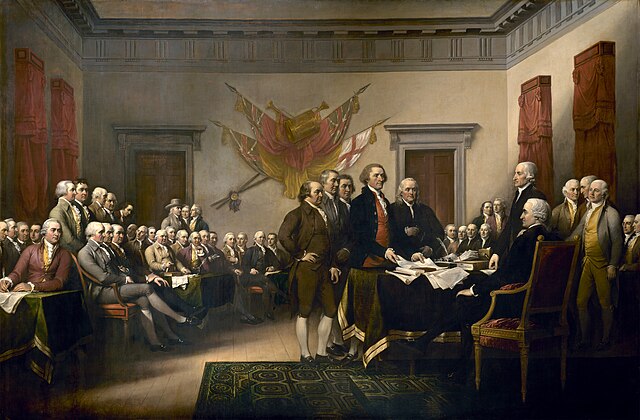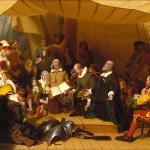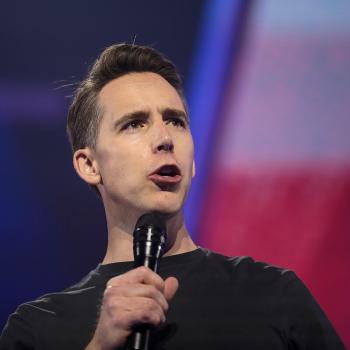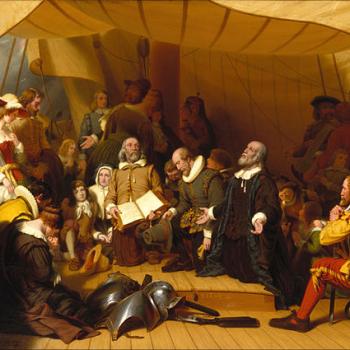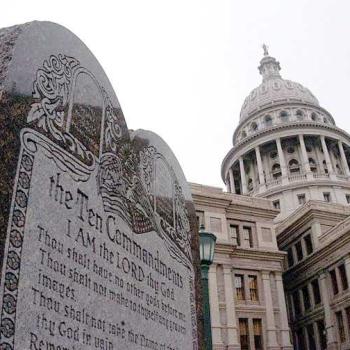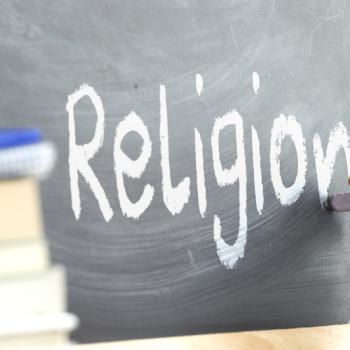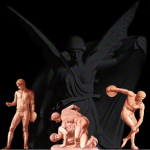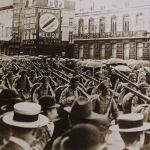The Declaration of Independence mentions God three times, in three different ways. Near the beginning there is “Nature’s God,” then later there is “Creator,” and toward the end “Divine Providence.” For this reason the Declaration is often cited by Christian nationalists in their arguments that the United States was founded to be a “Christian nation.” But the Declaration of Independence was written primarily by Thomas Jefferson, who also is closely associated with the metaphorical wall of separation between church and state that Christian nationalists abhor. How did that happen?
First, it’s important to understand that the Declaration was an argument for a right to rebel, or an apology for revolution. You can read the entire Declaration here. In writing the Declaration, Jefferson was much influenced by John Locke’s Second Treatise on Government, which had been published in 1690. Most educated people of 1776 who read Jefferson’s text probably made that connection. Jefferson was drawing on a well-known theory of government to strengthen his case, in other words.
The Legacy of John Locke
And what did John Locke say? For centuries, the monarchs of Europe had assumed their authority to rule came from God. Locke argued that neither scripture nor reason supports that idea. Locke also wrote, “And where the body of the people, or any single man, is deprived of their right, or is under the exercise of a power without right, and have no appeal on earth, then they have a liberty to appeal to heaven, whenever they judge the cause of sufficient moment.” In other words, where there is legitimate government, when one is wronged one may seek help from the government. But when the government is oppressive and deprives the people of their natural rights, then they may throw off that government to protect those rights God gave them.
So it was that Jefferson wrote,
We hold these truths to be self-evident, that all men are created equal, that they are endowed by their Creator with certain unalienable Rights, that among these are Life, Liberty and the pursuit of Happiness.–That to secure these rights, Governments are instituted among Men, deriving their just powers from the consent of the governed, –That whenever any Form of Government becomes destructive of these ends, it is the Right of the People to alter or to abolish it, and to institute new Government, laying its foundation on such principles and organizing its powers in such form, as to them shall seem most likely to effect their Safety and Happiness.
(You might recognize the argument that our rights come from God, not the government, as a long-time favorite of American consservatives. And perhaps that is true. Yet the human beings who live in totalitarian dictatorships also have those same rights, in theory, but cannot exercise them. In reality we can exercise only those rights our government and fellow citizens recognize. So even if rights come from God, it’s up to us to maintain and protect them.)
Which God Is in the Declaration?
Note also that Jefferson used very generic terms for God. Monotheists of any tradition — not just Christians — can see their version of God in the Declaration. Jefferson was arguably the most out-of-the-closet Deist of all the Founding Fathers. The Deists believed in God but not in the divinity of Christ. Late in his life Jefferson created his own version of the Gospels by cutting passages from six copies of the New Testament — in Greek, Latin, French and King James English — and pasting the passages he wanted to keep into a leather-bound book. Jefferson’s Bible, titled The Life and Morals of Jesus of Nazareth, left out accounts of miracles and the Resurrection and focused instead on Jesus’ moral teachings. Note that Jefferson also owned an English translation of the Qu’ran.
Further, as understood by Deists God does not perform miracles but works through natural processes. The phrase “Nature’s God,” from the opening paragraph of the Declaration, is not exclusively Deist but echoes Deist sentiment.
Jefferson believed fervently that a person’s religious beliefs were his own business. Government need not be involved. He wrote in his Notes on the State of Virginia,
The error seems not sufficiently eradicated, that the operations of the mind, as well as the acts of the body, are subjects to the coercion of the laws. But our rulers can have authority over such natural rights only as we have submitted to them. The rights of conscience we never submitted, we could not submit. We are answerable for them to our God. The legitimate powers of government extend to such acts only as are injurious to others. But it does me no injury for my neighbour to say there are twenty gods, or no god. It neither picks my pocket nor breaks my leg.
In conclusion, I say it’s genuinely silly to argue that Jefferson’s Declaration of Independence has anything to do with founding a “Christian nation.”
Background on the Declaration of Independence
When the Second Congress convened in Philadelphia in May 1775, independence from Britain was not yet on the table. The First Continental Congress first met in 1774, when representatives of twelve of Britain’s thirteen American colonies — Georgia declined to participate — came together to discuss their grievances with the Crown. By the time representatives of all thirteen colonies met in the Second Congress, relations with Britain had deteriorated further. Indeed, many delegates had learned about the battle of Lexington and Concord, April 19, 1775, while traveling to the convention. In effect, revolution had already begun. Still, the delegates cautiously weighed their options and considered several ways forward, including reconciliation with Britain.
But in time independence appeared to be the only way open to them. by May 1776 several states were pushing for independence. In June the delegates decided to postpone a vote to declare independence to early July, while a committee of five men took on the responsibility of producing a document that would make the case for indpendence to the world. The five were John Adams of Massachusetts; Roger Sherman of Connecticut; Benjamin Franklin of Pennsylvania; Robert R. Livingston of New York; and Thomas Jefferson of Virginia. Jefferson would be the chief author of the Declaration of Independence, but Adams and Franklin made a few changes.
The Second Continental Congress reconvened on July 1, 1776. On July 2, a resolution to declare independence that had been authored by Richard Henry Lee of Virginia was adopted by 12 of the 13 colonies (New York did note vote). The next order of business was reviewing Jefferson’s Declaration. The debates among the delegates resulted in a few more alterations, but by the morning of July 4 the Declaration of Independence was adopted. The amended document was taken immediately to a printer, and distribution of the Declaration began on July 5. But the official signing ceremony of the officially adopted Declaration didn’t happen until August 2.
